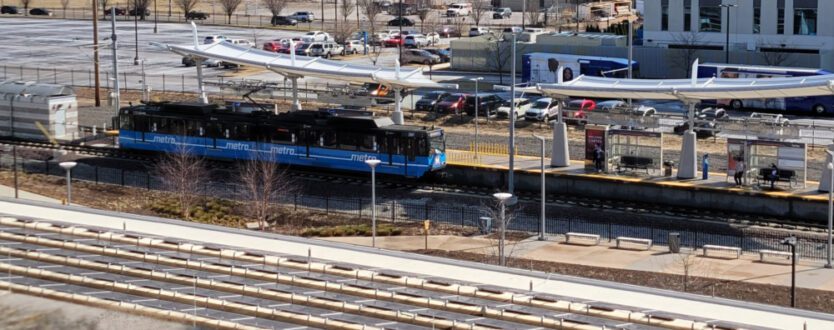
Mobility + Transportation
Cortex has the potential for a street network accommodating diverse ages and abilities using multiple travel modes and shared mobility options.
Ideal Future State
Cortex is a haven for low-carbon arrivals, including transit, walkability and bikeability.
Why Important
In terms of relationships, Mobility + Transportation are linked to the equity of physical surroundings (extent and quality of the pedestrian network); resilience (transit or travel disruptions); and carbon emissions (from transportation energy use).
Objectives / Targets
- A third of those working in the District do not arrive by car by 2030.
- Half of those working in the District arrive by zero emissions (EV, bike, walk, offsets) by 2030.
- Develop partnership with last mile solution (tram, trolley, scooter, bike share) by 2025.
- Upgrade street network to support all travel modes (not just vehicles).
- The street network accommodates people with a diversity of ages and abilities.
- District travel, internally and externally, is multimodal.
- Quality wired and wireless connectivity is available throughout the District.
- Transportation sharing programs are robust (participating aligns with targets).
- Incentivize connected greenspaces, bikeways and walks across the District.
- Require connected streets, connected greenspaces, traffic calming, and sidewalks for walkability.
Indicators
EcoDistricts framework for Transportation Priority; LEED for Neighborhood Development.
Baselines
City of St Louis Updated (2020) Sustainability Targets for Transportation.
Future Targets
- Launch partnership for last mile solution (target Metro station hub) by 2026 .
- ⅓ of workers in District arrive without car; ½ arrive by zero emissions by 2030 .
- 100% zero emissions for all transport through the District by 2040 .
Immediate Steps
Offer District as pilot with City and Metro Transit Agency for last-mile solution.
Short-Term Steps
Require upgrades for EV infrastructure in existing parking facilities (see incentives list).
Long-Term Steps
Explore looping tram (zero emissions) solution with full 2.5 mile loop in partnership with Washington University in St. Louis.
Challenges
Cortex doesn’t control any of the transportation infrastructure and can really only encourage adoption of these guidelines, but by having a clear vision, we can leverage our convening ability and leadership role to help our partners achieve these targets.

